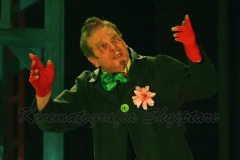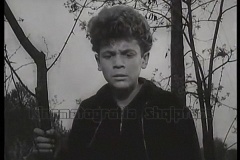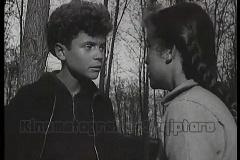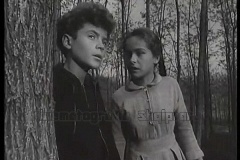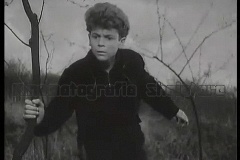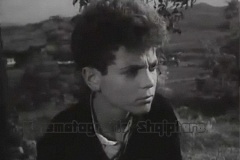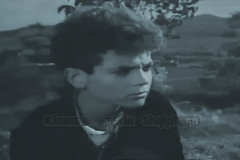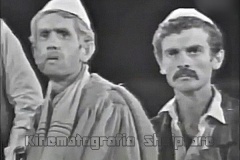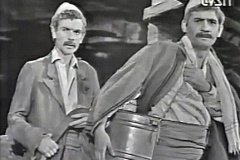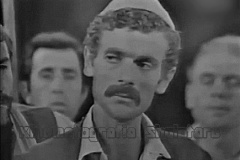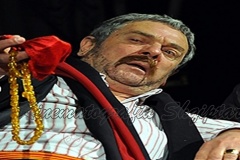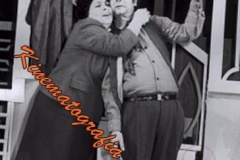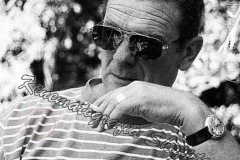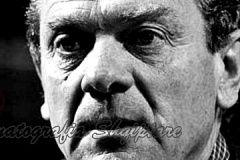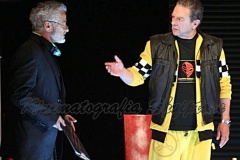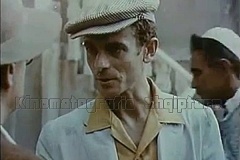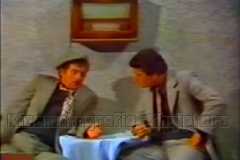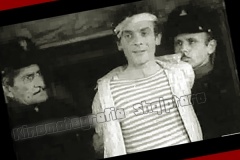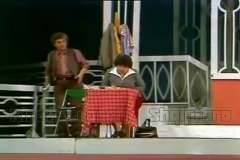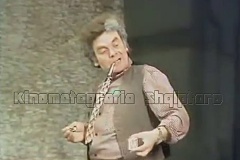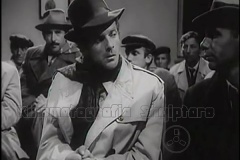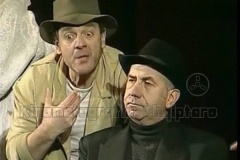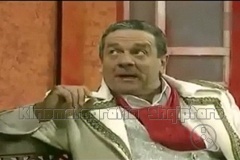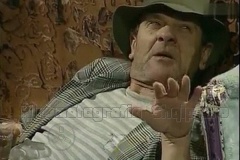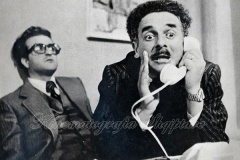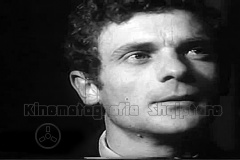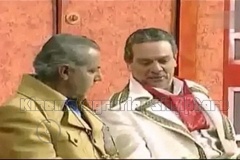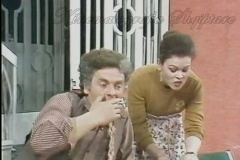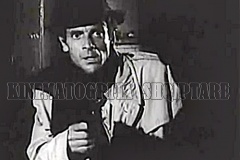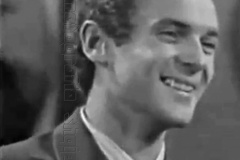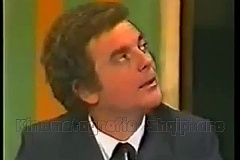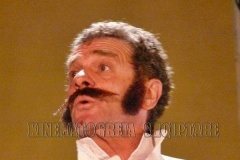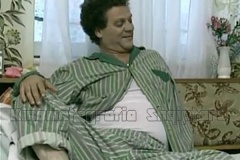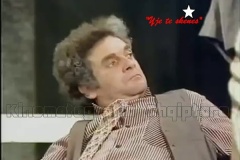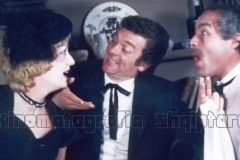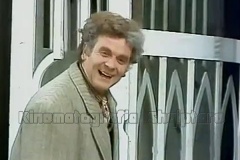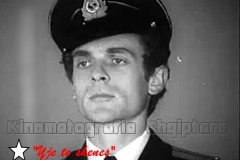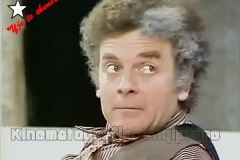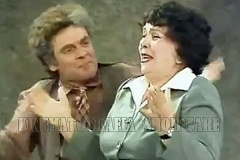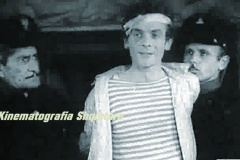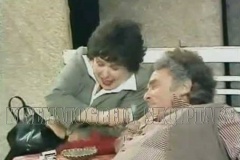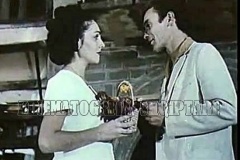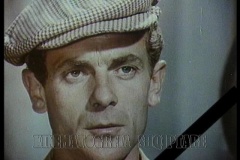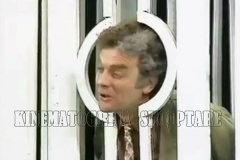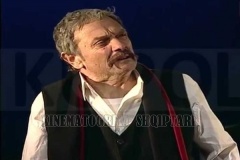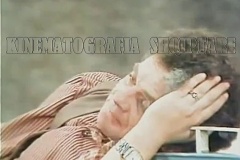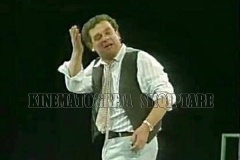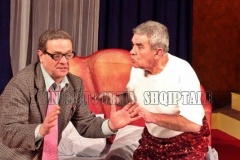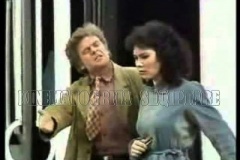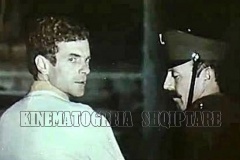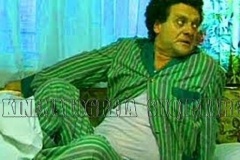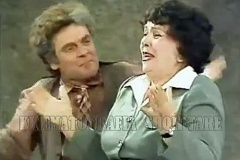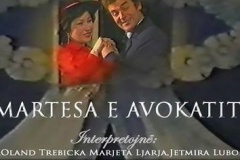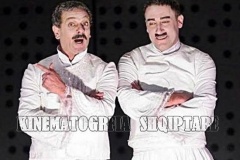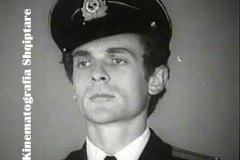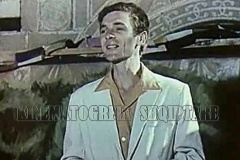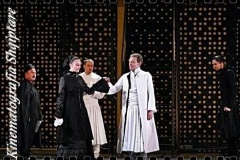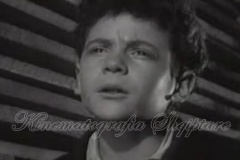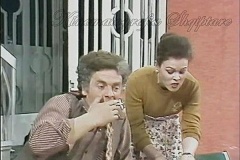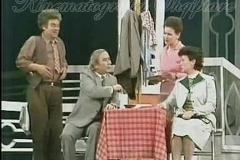Roland Trebicka (1947-2013)
Peerless comedian with a special style of interpretation.
Born in Korça on January 17, 1947. Finished high school in 1963. Later completed his studies in the drama branch at the “Aleksander Moisiu” high school for actors
Roland Trebicka’s career as an actor began with the role of Kosta, in the film “Debatik”, in 1961. It was this experience that marked the course that would later take the life of the poor boy.
His extraordinary penchant for spontaneous humor secured him a “privileged” position during his military service: he served as an actor in the professional Estrada of the SKUP (Central House of the People’s Army) or “Army’s Estrada” in 1969.
Years in this professional troupe, where other actors debuted who would later become famous in the field of stage and television comedy, such as Aleko Prodani, Koco Devole, Zef Deda, Sejfulla Myftari (Cekja), Mehdi Malkaj, Behar Mera, etc., were for Trebicka, the necessary internship, which then opened the way to the “Teatri Popullor”, in 1970. Trebicka has a long career of about 30 years on the stage of this institution.
He started his career with character of Ylli in the show “House on the Boulevard” and with another small role as a waiter in the drama “Final year student”. Trebicka has performed about 100 roles in the theater.
Initially, he did not have any success in dramatic or heroic roles, but after a few years, he tried comical ones and it was here that he managed to show his acting skills, giving his artistic individuality a clear face profile.
This path begins with the role of George Leon in the comedy “The man who saw death with his eyes” by V. Eftimiu in 1973, continues with Sir Endrew in another Shakespeare comedy “Twelfth Night” in 1982, and Jani in Ruzhdi Pulaha’s drama “Against Oneself” in 1984. Trebicka`s most famous and brilliant character is that of Jovan Bregu in ” Palace 176″ of Adelina Balashi in c. 1986, where he reached the highest acting levels.
Even today, with about 500 performances in seven years, with dozens of TV broadcasts and tens of thousands of copies of videotapes sold, “Jovan Bregu” is the most popular figure of the Albanian scene, whose jokes have long since become part of folklore and slang today.
His mastery in this role strongly influenced the comedy to break all previous viewership records. He repeated this role in Ilir Bezhani’s “Cmendina” (2001).
Also Trebicka stands out with other roles in the following, such as that of Gennarino in Eduardo De Filippo’s comedy “Great magic” in 1994, and that of Zanardelli in Moliere’s comedy “Don Juan” in 1995.
Two years later he plays the role of Khlestakov in another comedy “Inspector (Revizori)” by Gogol.
The 2000s begin with a role of Thimma in a farcical style, in the comedy “Miss 39” with the subtitle “I want a man” by Saqellaris. A year later, in 2002, he charmingly plays the role of the husband in the comedy “A Man with Roses” by Dario Fo.
With these two achievements, he once again showed his ability to play beautifully both in the field of farce and the grotesque, as well as in the field of irony and sarcasm.
In the interpretation of the character of Nicholas in Spiro Comore’s comedy “Carnivals of Korce” (2003), he brought himself to a different plan and perspective, mostly of an entertaining humor, rather than sharp political satire or sarcasm, flow and product of social environments close to the reality of the transition period of the late 90s.
In 2002, was nominated for the role of the guard in Ionescu’s comedy “The King is Dying” of the National Theater at the International Experimental Festival of Cairo in Egypt, while in 2004 masterfully interprets the charioteer and the rich man Jak in Moliere’s comedy “Kopraci”, simultaneously creating two close figures (as the lower layer).
His activity in the theater continues with the character Almaviva in de Beaumarchais well-known comedy “The Barber of Seville”, under the directorial concept of the Frenchman Erik Vignette, performed by him in a perfect style, with rhetorical movements, choreography and elegant references when he appears as aristocrat with the gestures and speech of a zealot.
In Gezim Kame’s comedy “Te gjithe me huqe” in 2009, Roland Trebicka brings the man who suffers from the mania of numbers, becoming the main tool of manipulation of the stage action as a means of simultaneously fooling others and himself.
After a three-year experience with the “Publimedia” company, he returns to the National Theater. Critics and colleagues have consistently rated him with maximum marks for his extraordinary sense of humor, on and off stage, in and out of role.
He is a master of the farce and the grotesque, basing his game on a wild fantasy and unpredictable improvisations, not only for the viewers, but also for the partners.
On the other hand, he is a champion of dedication and discipline at work. These qualities of his have made him one of the most sought-after actors by directors.
Trebicka also played in several feature films, among which it is worth mentioning “Dream of a chair” (Vaska) and Concert in 1936 (Nasi).
Passed away at the age of 66 after a serious illness on March 6, 2013. He holds the title “Merited Artist”
Some of Films and Comedies:
1961 — Debatik……..Kosta
1978 — Concert in year `36…….Nesti
1979 — Radio Station…..One of the technicians
1984 — Dream of a chair……Vaska
He’s coming (sequel to the comedy “Palace 176”);
Fans…….Dhimu;
The longest sleep
I want a liar.
Theatre:
1969 – “Red Signal” by Bashkim Kozeli
24/03/1974 — “The Fisherman’s Family” by S.Pitarka ……..Petriti
1976 – Arturo Ui…..
The Communists……A drunk young men
17 /09/1982 — Shakespeare’s “Twelfth Night”
04/12/1987 — Lawyer’s Marriage by F. Postoli
04/20/1990 — Waltz of Titanic by Tudor Mushatescu’s…..Papuli 17/03/1994 — The Great Magic of de Filippo……Xenarino
04/04/1994 — “8 Persona plus” of Ferdinand Radi….Filipi
— /– /1996 – – Don Juan…..Zganareli
During the 2000s:
2001 — “The King is Dying” by Ionesco
2003 — “Better tomorrow than the day after tomorrow” by Milto Kutali;
2004 — “Kopraci” by Moliere
2005 – The Nannies
02/11/2007 –Frank V by Friedrich Dyrrenmatt
2007 — The Barber of Seville by Pierre-Augustin Caron de Beaumarchais
15/12/2008 — Trojans by Euripides
2009 – Time to go crazy
Other shows: “It’s falling outside” by Vincenzo Salemme; “The fox of Troy” (Interpretations of Ferid Lamajt’s fables); “For me Mirjam and Sandri” by Aqif Mulliqi; “We all sang Margarita” by Bashkim Hoxha; “A man with a rose”; “Gomone”; “Dream of Ismail Qemali” 2013 (return to the stage of Bashkim Kozeli’s drama);
Awards and Titles
August 5, 1991 “People’s Artist” with the motivation: “As a theater actor, he has stood out for high artistic level interpretation, with originality and fantasy of many roles, giving his help in the development of our stage art”.
Published for the first time in 2014
_________________________________
Albanian Cinematography since 2013
Reference: “Encyclopedia, Theater and Albanian Cinematography” – Toena 2009. p. 528 / 60 years of National Theater (1945-2005) F. Sllatina, publishing house 55. P. 81.
Follow us: Blog: https://albaniancinematography.blogspot.com/ Facebook: https://www.facebook.com/ksh.faqjazyrtare Dailymotion: https://www.dailymotion.com/kinetografiashqiptareartisporti YouTube: https://www.youtube.com/channel/UCDRYQ5xCyGkfELm3mX8Rhtw
Discover more from Albanian Cinematography - Sport
Subscribe to get the latest posts sent to your email.

